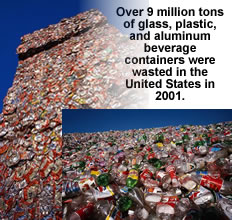
 |
| Home > Policy Issues > Beverage Container Recycling > Introduction | ||
IntroductionRecycling = Saving Energy = Reduced Pollution We can save energy and protect the environment by recycling our beverage cans and bottles. Although the amount of energy saved differs by material, almost all recycling processes achieve significant energy savings compared to virgin material production. For example, recycling aluminum cans saves 95% of the energy required to make these cans from bauxite ore and other raw material. Reduced energy and raw materials consumption means a reduction in pollution from manufacturing – pollution that causes acid rain, smog, mercury-poisoned lakes and streams, and global warming. Recycling beverage containers greatly reduces litter; it reduces the demand for oil drilling, damming for hydroelectricity, and environmentally destructive strip-mining for coal and other minerals. It also lessens the burden on landfills. |
||
|
||
Beverage container recycling has been steadily declining for several years. One way to stop this negative trend is for states to implement deposit laws. Putting a five- or ten-cent deposit on beverage cans and bottles may not be a panacea for beverage container litter and waste, but deposit systems have proven to be an effective way of discouraging litter and improving recycling rates. This web site offers the tools necessary for you to implement an effective beverage container recycling system in your state, including a sample bill, talking points, press clips, a fact pack, research, and other background information. We may have other useful materials on this subject, which are not posted on our web site. Please feel free to contact us at [email protected] or call our office in Madison, Wisconsin, at (608) 252-9800. Special thanks to the Container Recycling Institute providing information and assistance on this issue. If you’ve used this site and found it helpful or, if you have suggestions about how it could be made more helpful, please let us know. Feel free to use the sample bill text included here in your state. If you do, please notify us. |
||
| This package was last updated on February 10, 2004. |
